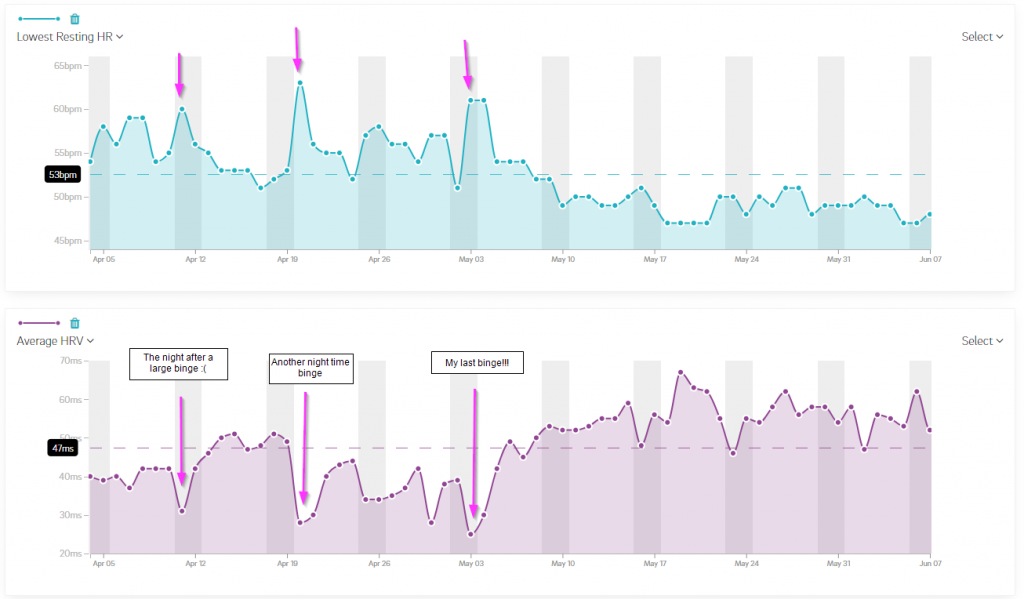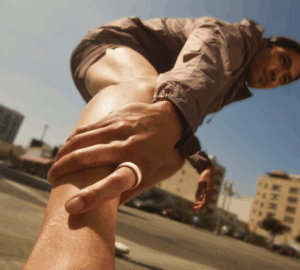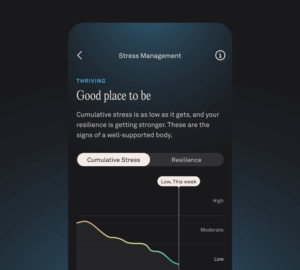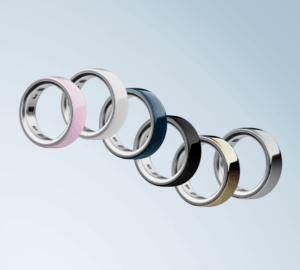Tracy, an IT project manager, has battled eating disorders for as long as she can remember.
The Early Years
“Seriously, since I was probably 8 years old. I remember being hungry in the middle of the night, sneaking down to the kitchen, and filling up to the point of gorging on chips and toaster bagel pizzas. I don’t even know if my parents knew. I gained weight and that was my eating life until I topped out at 225 in 10th grade in high school. For reference I’m a 5’ 5” female person.”
After reaching that point, Tracy turned towards diet and exercise—something that would unfortunately cause more harm than good.
“I went on a super strict diet cutting calories and started walking at first to work out, then exercise videos – No Running!!! . . . Away at school, I crashed, hard. I had no energy. I was eating less than 1000 cals / day, exercising at least 1hr / day, and almost constantly fighting urges to binge. That turned into binges, followed by more exercise and restriction and attempts at purging, some more or less successful than others. I was a mess. I knew I needed help.”
Fortunately, Tracy’s next attempt to get help was a bit more positive for her and her health.
“A nutritionist helped tons. I stopped restricting, which stopped the binging, and though I gained ~40 lbs back, my body like kicked back on, and then I started losing weight like magic.”
But eating disorders can be powerful, and when someone isn’t fully ready to address the issues, relapse can be just around the corner, which can be detrimental to a person’s progress.
“I saw a therapist, but I was not totally ready for therapy and not able to be honest with her or myself . . . I stabilized around 150 which was a good setpoint for me. I thought I was good, that I was ‘cured’. I was 21 at the time. Over the next 14 years, I’m 35 now, I’ve gone through this cycle after cycle.”
Present Day
Today is May 20th, 2020, and it has been a little over 2 weeks since Tracy’s last binge cycle ended. With the COVID-19 pandemic still at large, the stress of a new shelter-in-place reality is the last thing Tracy needed.
“Even before the pandemic, I was cycling in and out of active binging. On the worst nights, I would feel transfixed, like pulled to the kitchen under a spell . . .The added stress from shifting to remote work and not being able to see my family out of state just piled on.”
But, unlike 14 years earlier, the technology to help her see the effects of her binging was wrapped around her finger.
“I was first aware of the effects of binging in my Oura data after first seeing an Oura blog post about heart rate when sleeping. That we all want the ‘hammock’ shape! I saw on nights when I binged my HR stayed really high and didn’t lower until late in the night. I also never had high HRV – I was in the 30s / 40s. It would take a few days for my body to get back into a ‘normal’ or ‘healthy’ state again.”
This was what she saw:

In her Oura on the web dashboard, Tracy was able to literally see the effects of her binging. Her body was taking a beating, and it showed in her heart rate stats. Her HRV plummeted, and her nighttime resting heart rate was through the roof—her body was communicating to her that it was in distress.
After her last binge on May 3rd, her body had hit a new low. Her average HRV hit 25 ms—almost 20 points below her baseline.
After this night, Tracy decided to use her ability to identify binge urges and take a more serious step. So, she started a macro tracking plan to ensure she was getting the nutrition her body needed. No more second-guessing.
“I knew I’d have the ring for extra feedback on how I was doing.”
Tracy & Her Oura Ring
Oura was not only important to Tracy’s powerful wake-up call, it now plays an essential role in motivating her to keep going.
“Last night I was feeling a lead up to a binge episode. I reminded myself of all of my progress, that I want to see my HRV trend continue, I want to feel good. I stopped eating, took a few breaths, and finished doing dishes.”
When it comes to binging, sometimes there’s more than one hurdle each night, and that’s where Tracy is making progress, using Oura and the insights she receives to understand how her choices affect her health.
“Later on I tried a moment to relax. I felt a little edgy before bed and it was just what I needed to wind down. I’ve just started using Moment and think they will be a great tool to check in with myself after I feel a binge urge. I’m so excited to add Moments as something I can do to help recognize and manage my internal state.”
And now, Oura has become an integral part of her daily routine.
“It’s like the first thing I check in the morning on my phone! I check in during the day to make sure my activity is on track, too. I check the online dashboard less than weekly, but might check it even more often now—I was so surprised to see in those screenshots how connected my bingeing was to my HRV and heart rate. When I looked back at the calendar and my food log it just sealed the deal even more. Oura is a great tool for tracking my recovery.”
With Oura, Tracy continues to empower herself, so she can keep on her current path, and guide herself through any adversity she may face.
Some Tips From Tracy
- “Keep trying. I’ve never been able to ‘just feel’ binge urges before—I always felt them and then binged. You can totally get there, just because you have the urge to eat doesn’t mean you have to. If you don’t eat, yeah, you’ll feel pretty awful, but it goes away. It took me 27 years to really understand that, and I’m not going back!”
- “Find motivation. Something to feel GOOD about, not guilty about. Don’t beat yourself up for binging, that only makes you feel like crap and then more likely to binge again. Oura is my feel good reminder. I can see the progress from not bingeing better than the scale, better than any journaling that is subjective, it is objective proof that I’m treating my body well and that my choices today really make a difference. It counteracts all the rationalizing I would have done to justify another binge.”
- “Work on your internal state. If you’re feeding your body enough (I need a macro coach for this I am so out of touch with my own hunger signals) then your urges to binge are really in response to how you handle stress / emotions. Yeah, I didn’t want to believe that for years, either, but in the end it makes it easier. I can tell myself ‘Oh, I’m having a binge urge’ and then get out of the kitchen, go for a walk, and lately I’m trying out Oura’s moment sessions to just check in with myself and relax. Most of the time, after a little peace and quiet, my binge urges are gone for the night.”
What’s Your Oura Story?
Everyone’s story is unique. Share yours with the Oura Community, or just give the Oura Team an update of where you are in your health journey!











